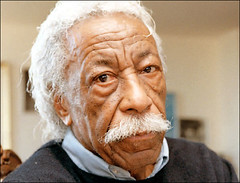Gordon Parks, a Master of the Camera, Dies at 93
By ANDY GRUNDBERG, NYTimes
Gordon Parks, the photographer, filmmaker, writer and composer who used his prodigious, largely self-taught talents to chronicle the African-American experience and to retell his own personal history, died yesterday at his home in Manhattan. He was 93.
Gordon Parks was the first African-American to work as a staff photographer for Life magazine and the first black artist to produce and direct a major Hollywood film, "The Learning Tree," in 1969.
He developed a large following as a photographer for Life for more than 20 years, and by the time he was 50 he ranked among the most influential image makers of the postwar years. In the 1960's he began to write memoirs, novels, poems and screenplays, which led him to directing films. In addition to "The Learning Tree," he directed the popular action films "Shaft" and "Shaft's Big Score!" In 1970 he helped found Essence magazine and was its editorial director from 1970 to 1973.
Mr. Parks's years as a contributor to Life, the largest-circulation picture magazine of its day, lasted from 1948 to 1972, and it cemented his reputation as a humanitarian photojournalist and as an artist with an eye for elegance. He specialized in subjects relating to racism, poverty and black urban life, but he also took exemplary pictures of Paris fashions, celebrities and politicians.
"I still don't know exactly who I am," Mr. Parks wrote in his 1979 memoir, "To Smile in Autumn." He added, "I've disappeared into myself so many different ways that I don't know who 'me' is."
Much of his literary energy was channeled into memoirs, in which he mined incidents from his adolescence and early career in an effort to find deeper meaning in them. His talent for telling vivid stories was used to good effect in "The Learning Tree," which he wrote first as a novel and later converted into a screenplay. This was a coming-of-age story about a young black man whose childhood plainly resembled the author's. It was well received when it was published in 1963 and again in 1969, when Warner Brothers released the film version. Mr. Parks wrote, produced and directed the film and wrote the music for its soundtrack. He was also the cinematographer.
"Gordon Parks was like the Jackie Robinson of film," Donald Faulkner, the director of the New York State Writers Institute, once said. "He broke ground for a lot of people — Spike Lee, John Singleton."
Mr. Parks credited his first awareness of the power of the photographic image to the pictures taken by his predecessors at the Farm Security Administration, including Jack Delano, Dorothea Lange, Arthur Rothstein and Ben Shahn. He first saw their photographs of migrant workers in a magazine he picked up while working as a waiter in a railroad car. "I saw that the camera could be a weapon against poverty, against racism, against all sorts of social wrongs," he told an interviewer in 1999. "I knew at that point I had to have a camera."
See more in the NYTImes article.
Subscribe to:
Post Comments (Atom)


No comments:
Post a Comment